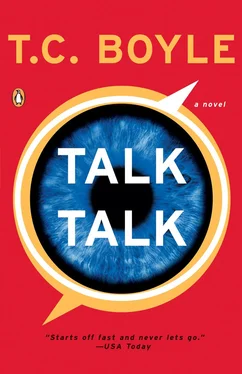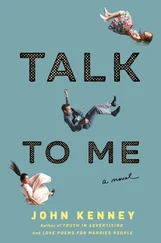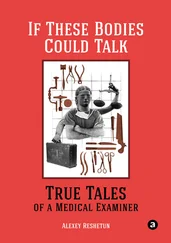She plunged her hand into the outer pocket on the left side and came up with a comb to which a straggle of dense dark hairs adhered, a Sharpie pen that looked unused and a thin wad of tissue. An odd feeling came over her, even as Bridger turned to her and said, “How do I look?” She slid her fingers over the teeth of the comb, lifted it to her nostrils-there was the smell of him again, of his scalp and the shampoo he used, and it was as if she knew him in some elemental way, as if she'd been with him, the violation mutual.
A light rain began to spot the windshield. Bridger's head floated there beside her, but he wasn't Bridger exactly, not with the slit reptilian orbits of his eyes, the reflective lenses slashing at his features, reducing him. “Take them off,” she said.
He swiveled his head and removed the sunglasses, and even as he said, “Is that it?” she dug into the other pocket and came up with a slip of paper, a receipt from Johnny Lee's Family Restaurant, and held it up to the light.
“What is it, a credit card receipt? That could be something. What does it say?”
It took her a moment, the print blurred and pointillated, but then it came together, the total, the tax, the account number and the slashing confident signature under the cardholder's name: “Bridger Martin.”
“We have to get rational about this,” he was saying, or at least that was what she thought he was saying. “Rational,” wasn't that it? Of course he might have been talking about “Rashomon,” the Kurosawa film, and for the tiniest sliver of a second she wondered just how the three of them-she, Bridger and the thief-fit into that scenario, with its shifting perspective and deconstructed narrative. She saw Toshiro Mifune, his mouth a rictus of fear and aggression, flailing his sword, and then she was back to Bridger, who was saying something else now, something she was too tired to process.
They were in a nondescript restaurant, fake wood paneling, lights so dim you could barely make out the menu, tuna on rye with a sliver of dill pickle for $9.95 and three dollars for iced tea. It was late in the afternoon now, high summer but wintry for all that, a damp high-altitude gloom hanging over the town as if this weren't California at all, but someplace perennially dreary. Like Tibet. Was Tibet dreary? Her mind was wandering. She was exhausted-and hungry-and here was the tuna sandwich she'd ordered herself in a voice that must have lost all control of the long vowels and those nearly impossible fricatives (a side of french fries) because the waitress had given her the interplanetary stare and she felt like some animal on a leash, but she didn't care: this was her life and there was nothing she could do about it. Not in her present condition. Plus she had Bridger to deal with-she'd dragged him into this, and now he was a victim too “(I don't even have a Citibank card,” he protested, and she imagined him whining, his voice reduced, plaintive, weak). Bridger was upset-she couldn't blame him-but her eyes dropped to the sandwich and shut him out.
He hadn't stopped talking even to draw breath since she'd pulled that charge slip out of the jacket pocket, and what was the term for that? “Logorrhea.” Yes, another SAT word to drill her students with, but she didn't have any students, not anymore. She was wandering, again she was wandering, and she was thinking, unaccountably, of the talk fests they used to have in the dorm at Gallaudet, in Sign mainly, but with people speaking aloud too in a way that was all but unintelligible to a hearie, a kind of sing-along moan that underscored the signs. “Talk talk.” That was what happened when the deaf got together, a direct translation into English-they talked a lot, talked all the time, talked the way Bridger was talking now, only with their hands. Index finger of the four hand at the mouth, tapping, tapping to show the words coming out. “When deaf get together talk talk all the time.” Communication, the universal need. Information. Access. Escape from the prison of silence. Talk, talk, talk.
Bridger's hand was on her wrist, the wrist of the hand that held the tuna sandwich as it moved to her lips. “You're making those noises,” he said.
She looked around her. People were watching. She tried to suppress the impulse, but it was almost unconscious, autonomic, a reaction to stress that most deaf people shared: she was emitting, had been emitting, a soft high-pitched keening sound, as if she were a dolphin washed ashore, and it embarrassed her. Her own throat produced these noises, her own larynx, and she had no control over them. “Sorry,” she said, and signed it too, right hand, palm facing in, the slow circle over her heart.
“You're not listening,” he said.
“I am,” she lied.
He looked away in exasperation, his features pinched, eyes rolling upward, and that made her angry, but she didn't want to make a scene, or any more of a scene than she'd already made with her dolphin noises, so she wiped her face of expression and focused on him. What he was talking about, the gist of it anyway, was that they were both tired and incapable of making a decision at this point (“I'm not going back,” she interrupted him, “and that son of a bitch is not going to get away with this, I swear, even if I have to crawl on my belly-or my abdomen, my abdomen-from here to New York, I'm going to nail him, you hear me?”), and that they needed to check into a motel, get some rest and decide what to do in the morning, because they were just frustrating themselves driving around looking for nothing, for a car that was a hundred miles away by now.
“I found him before,” she countered. “Didn't I?”
“Yeah, I know-the deaf have some kind of ESP, right? And it “was” amazing, I admit it, but you don't really believe in all that, do you?”
“No,” she said.
“Because if you do, maybe you can tell me what this jerk is going to do next, maybe you can visualize it, picture him cruising down the open road with our money in his pockets, free money, everything free-he doesn't have to worry about looking for the cheapest motel in town, does he? No, he's going to stay at the Ritz Carlton, he's going to-”
She set the sandwich down so she could use her hands. “He's Frank Calabrese,” she said, finger-spelling it beneath the words, “and he's going back to New York. And you know what?”
He lifted his eyebrows, leaned in close on the twin props of his elbows so that his face was inches from hers. The waitress, probably nineteen or twenty but so petite and baby-faced she looked more like twelve, darted her eyes nervously at them, and Dana felt distracted. There was a TV mounted on the near wall, ghost figures going through their silent motions. She felt a wave of depression crash over her even as Bridger threw it back at her: “What?”
“There's nothing to discuss. I don't care if I have a hundred nights' sleep in a row, I'm not going to change my mind.” Then she closed her mouth, shot a withering glance round the restaurant, and used her hands exclusively: “Whether you come along or not, I'm going after him.”
They checked into the Gold Country Motel with her credit card-neither of Bridger's was good, both maxed out thanks to Frank Calabrese-and she showered and then stretched herself across the white slab of the queen-size bed and stared at the ceiling like a zombie while Bridger paced back and forth, one hand pinning the phone to his ear while the other swooped, plunged and snatched at the air to underline the specifics of his distress. First he dialed the credit card companies, and then the CRAs, and it seemed to take him forever. She couldn't sleep. Couldn't even close her eyes. Her head throbbed where she'd hit the windshield and she seemed to have irritated something in her left knee when she slammed her way into the car in the parking lot of the restaurant outside Sacramento. At Bridger's insistence they'd stopped at a drugstore and picked up a tube of Neosporin and a package of Band-Aid sport strips, and she'd spent ten minutes dabbing at the wound-it was a purple blotch, like a birthmark, with a crusted gash in the center of it-but it was superficial and it was already healing and she didn't really want to call even more attention to herself by walking around with a shining square flesh-colored patch stuck to her head, so she'd parted her hair and combed it over to at least partially hide the contusion.
Читать дальше












